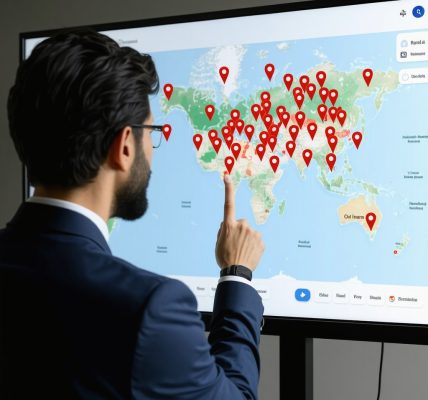Unlocking the Power of Google Maps SEO for Local Business Dominance
In the constantly evolving landscape of local search, mastering Google Maps SEO is essential for businesses aiming to command their local market presence. The intricate interplay of location data, user behavior, and algorithmic signals makes leveraging the right tools critical for outperforming competitors and securing premium visibility in Google’s local pack. This article dives into best-in-class tools that elevate your Google Maps SEO strategy, driven by advanced analytics and authoritative optimization practices.
Advanced Tools Shaping the Future of Local Ranking Optimization
Optimizing for Google Maps requires precision beyond basic listing management. Robust platforms like BrightLocal and Moz Local provide comprehensive citation management, ensuring consistent Name, Address, and Phone Number (NAP) data across directories, a factor Google heavily weighs in local ranking algorithms. These tools also automate review monitoring and generate insightful local SEO reports, empowering businesses to refine their strategies with data-backed decisions.
Furthermore, Google’s own tools such as Google My Business Insights integrate seamlessly with third-party applications, offering granular performance metrics like customer actions, local search queries, and photo views. These insights enable marketers to tailor content and engagement tactics to match evolving user intent, a move supported by recent findings published in Search Engine Land’s 2024 Google Maps ranking factors report.
How can niche-specific tools enhance citation accuracy and local SEO authority?
Specialized citation services such as Whitespark and Yext excel in managing local citations with precision across hundreds of relevant directories, significantly boosting local SEO authority. These platforms mitigate common pitfalls like inconsistent data and duplicate listings, which can dilute Google’s trust signals. Their advanced algorithms also analyze citation quality and competitive landscape, offering strategic recommendations to improve domain authority and prominence within hyperlocal markets.
Integrating User-Generated Content and Review Management Tools
Consumer reviews and Q&A interactions have surged as pivotal ranking factors in Google Maps SEO. Tools like Podium and Grade.us streamline review solicitation, aggregation, and response management, fostering higher engagement and trustworthiness. These platforms’ integration with Google My Business accelerates review visibility, which correlates directly with increased click-through rates and local conversions.
Harnessing Data-Driven Insights for Strategic Local Marketing
Data analytics platforms such as SEMrush and Ahrefs offer invaluable keyword research and competitive analysis tailored for local search optimization. By identifying high-intent “near me” keywords and mapping competitor citation profiles, these tools inform content strategies that align precisely with user search patterns. Combining these insights with Google Maps SEO tools enhances the ability to capture targeted traffic and convert local leads efficiently.
Explore More Expert-Level Strategies
To deepen your understanding and mastery of Google Business SEO, consider exploring this comprehensive guide on mastering Google Business SEO. It offers nuanced best practices and audit techniques designed for sustained local search performance.
Ready to elevate your local search rankings? Dive into expert resources and contribute your insights to the evolving field of Google Maps SEO at our professional community platform.
Unveiling the Impact of Citation Consistency on Google Maps Rankings
Citation consistency remains a cornerstone in the architecture of Google Maps SEO. Maintaining uniformity in your business’s Name, Address, and Phone Number (NAP) across all online directories is not merely a technical detail but a strategic priority. Discrepancies in citation information can lead to reduced trustworthiness in Google’s algorithm, ultimately harming your local search visibility and ranking.
Advanced citation management tools such as Whitespark’s Citation Finder and Yext ensure precision by scanning for inaccuracies and duplicates that could fragment your local SEO authority. By consolidating and correcting these data points, businesses create a coherent and authoritative digital footprint that Google rewards with improved local rankings and increased consumer trust.
How do evolving Google algorithm updates influence citation management strategies?
Google’s algorithm continuously evolves to prioritize user experience and authenticity, increasingly scrutinizing the quality and relevance of citations rather than sheer volume. Recent updates emphasize the importance of authoritative, niche-specific citations and penalize inconsistent or spammy listings. This shift necessitates a dynamic citation management approach, integrating real-time auditing and adaptive optimization tactics to maintain and enhance your local SEO positioning.
For example, BrightLocal’s Local Search Ranking Factors report (2024) highlights that citation accuracy and the diversity of citation sources are critical for sustained Google Maps ranking success, underscoring the need for strategic citation diversification across relevant platforms.
Innovative Review Management: Beyond Solicitation to Engagement
While soliciting reviews is fundamental, advanced review management platforms now emphasize genuine engagement and response strategies. Tools like Podium and Grade.us incorporate AI-driven sentiment analysis to identify key customer feedback themes and automate personalized responses. This not only enhances your business’s responsiveness but also signals to Google that your profile is actively managed and trusted by consumers.
Moreover, integrating review insights into broader marketing strategies enables businesses to spot service improvement opportunities and tailor promotional messaging effectively, driving customer loyalty and repeat visits. The direct correlation between review volume, quality, and improved local rankings makes this an indispensable facet of Google Maps SEO.
Harnessing Behavioral Analytics to Refine Local SEO Tactics
Google My Business Insights combined with third-party analytics platforms such as SEMrush and Ahrefs provide a comprehensive view of user behavior and search patterns. By analyzing metrics like click-through rates, direction requests, and call actions, businesses gain actionable intelligence to optimize their Google Business Profiles effectively.
Additionally, keyword research focusing on “near me” queries and voice search trends reveals emerging consumer intents, enabling the creation of highly targeted content and offers. This data-driven approach ensures that local SEO strategies remain aligned with evolving search behaviors, maximizing visibility and conversion potential.
To explore practical implementation of these insights, consider reviewing our detailed guide on optimizing your Google Business listing effectively for comprehensive tactics.
Ready to transform your Google Maps SEO strategy? Share your experiences or ask questions in the comments to join a community committed to mastering local search optimization.
Entity-Based Optimization: Elevating Google Maps SEO with Semantic Precision
As Google’s algorithms grow increasingly sophisticated, entity-based SEO has emerged as a pivotal strategy for enhancing Google Maps rankings. Unlike traditional keyword-focused approaches, entity-based optimization emphasizes the identification and association of unique business entities through structured data and semantic relevance. This method enables search engines to better understand the context and relationships of your business within the local ecosystem, thereby improving visibility and trust.
Implementing schema markup tailored for local businesses, such as LocalBusiness and Place types, enriches your Google Business Profile with machine-readable data. This structured data not only clarifies your business attributes (e.g., services, operating hours, geo-coordinates) but also enhances rich result eligibility, which can significantly boost click-through rates.
Moreover, aligning your content and citations with semantically related entities—such as nearby landmarks, industry-specific terms, and community organizations—strengthens topical authority within Google’s Knowledge Graph. Tools like Screaming Frog SEO Spider and SEMrush can help identify and integrate relevant semantic entities effectively.
How does entity-based SEO reshape local search relevance and ranking dynamics?
Entity-based SEO shifts the focus from mere keyword matching to understanding the intrinsic meaning and context of your business and its environment. Google’s Knowledge Graph leverages entities to connect your business with related concepts and locations, which enriches the relevance signals it uses to rank local listings.
For instance, when your Google Business Profile references entities like local landmarks, business categories, or even customer personas through reviews, it creates a dense network of semantic connections. This network signals to Google that your business is an authoritative and contextually relevant entity within its domain, thereby enhancing your chances of appearing in the coveted local pack.
The practical implication is that entity-centric optimization requires a meticulous audit of your digital footprint, focusing on the consistency and depth of semantic linkages rather than just keyword density. Adopting this strategy encourages a holistic approach to content creation, citation building, and review management, all intertwined through an entity-aware lens.
Leveraging Artificial Intelligence for Predictive Local SEO Enhancements
The integration of artificial intelligence (AI) in local SEO tools is revolutionizing how businesses anticipate and adapt to changes in search behavior and Google’s ranking algorithms. Advanced AI-driven platforms analyze vast datasets encompassing search trends, user engagement, and competitive landscapes to forecast shifts in local search dynamics.
For example, AI-powered sentiment analysis on reviews and Q&A can uncover subtle changes in consumer preferences or emerging service gaps, enabling proactive content and service adjustments. Predictive analytics also aid in identifying high-potential “near me” keywords before they trend, giving businesses a competitive edge.
Leading platforms like BrightLocal and Yext are incorporating AI modules that automate recommendation workflows, optimize review solicitation timing, and personalize customer engagement strategies based on behavioral predictions.
Can AI-driven predictive analytics mitigate risks from volatile local search algorithm updates?
Indeed, AI’s capacity for real-time data analysis and pattern recognition allows businesses to stay ahead of algorithmic volatility. By continuously monitoring ranking fluctuations and correlating them with recent changes in Google’s local search criteria, AI tools provide actionable insights to recalibrate optimization efforts swiftly.
This agility reduces the lag time between algorithm updates and response implementation, minimizing ranking disruptions. Furthermore, AI-driven scenario modeling can simulate the potential impact of various optimization strategies, empowering businesses to choose the most resilient tactics tailored to their unique market conditions.
For a technical deep dive into AI applications in SEO, refer to the comprehensive research by Li et al. (2021) on AI-enhanced search ranking models, which underscores the transformative potential of AI in search engine optimization.
Implementing Cross-Platform Local SEO Synergies for Maximum Impact
Google Maps SEO does not operate in isolation. Integrating your Google Business Profile strategy with other digital channels—such as social media, local directory listings, and voice search platforms—creates synergistic effects that amplify your local presence.
For instance, consistent branding and NAP data across Facebook, Yelp, Bing Places, and niche directories reinforce your entity’s credibility. Simultaneously, optimizing for voice assistants like Google Assistant and Amazon Alexa requires conversational content and structured data that align with voice query patterns.
This multichannel approach not only diversifies your local search footprint but also caters to varied user intents and device preferences, increasing overall engagement and conversions.
How can businesses effectively synchronize Google Maps SEO with voice search optimization?
Voice search optimization demands a conversational and natural language focus, targeting question-based queries and local intent. Businesses should incorporate FAQs in their Google Business Profiles and website content, emphasizing long-tail keywords and local vernacular.
Additionally, ensuring your structured data is compatible with voice search schemas enhances the likelihood of your business being featured in voice assistant responses. Tools like Google’s Structured Data Testing Tool help validate markup compliance.
Strategically aligning your Google Maps SEO with voice search optimization not only captures emerging traffic streams but also solidifies your brand’s presence in the increasingly conversational search landscape.
Explore these advanced strategies and elevate your local SEO game further by joining our expert community forum, where you can engage with seasoned professionals and access cutting-edge insights tailored for Google Maps optimization.
Decoding the Synergy Between Hyperlocal SEO and Google Maps Optimization
As the digital ecosystem grows increasingly fragmented, hyperlocal SEO strategies have become indispensable for businesses seeking to dominate micro-geographical segments within Google Maps. This approach involves tailoring your digital assets and content specifically for neighborhoods, districts, or even street-level targeting, leveraging granular data points to outmaneuver competitors in saturated markets.
By integrating hyperlocal keyword clusters with precise geotagged images and localized landing pages, businesses can signal heightened relevance to Google’s regional algorithms. Tools like GeoRanker and BrightLocal’s Hyperlocal Rank Tracker facilitate tracking on these micro-scales, offering nuanced insights that traditional local SEO metrics often overlook.
What advanced methodologies optimize hyperlocal signals to enhance Google Maps rankings?
Advanced methodologies include deploying localized schema markup embedded with neighborhood-specific attributes, optimizing Google Posts with hyperlocal events or news, and cultivating partnerships with local community websites to generate authoritative backlinks. Additionally, harnessing GPS-based user behavior analytics enables the fine-tuning of content and offers that resonate with hyperlocal search intent.
Ensuring NAP consistency at this micro level is critical; discrepancies even within sub-localities can dilute the entity’s perceived authority. Combining these tactics with AI-powered sentiment analysis of hyperlocal reviews can reveal subtle consumer preferences, enabling businesses to adapt rapidly to local market nuances.
Capitalizing on Emerging Technologies: Augmented Reality and Local Search Integration
The intersection of augmented reality (AR) and Google Maps SEO presents cutting-edge opportunities to engage users within their immediate surroundings. AR-enabled applications allow businesses to overlay digital information onto physical environments, offering immersive experiences that can drive foot traffic and enhance brand recall.
Incorporating AR content aligned with your Google Business Profile, such as virtual tours or interactive product demonstrations, can augment user engagement metrics, a factor increasingly recognized by Google’s behavioral ranking signals. Platforms like Google’s ARCore and Apple’s ARKit provide frameworks to develop these localized AR experiences effectively.
Leveraging Blockchain for Enhanced Citation Trustworthiness in Local SEO
Blockchain technology is emerging as a transformative solution to verify and secure citation data integrity across local directories. By creating immutable records of business information updates and citations, blockchain can significantly reduce fraudulent listings and data inconsistencies that harm local SEO performance.
Implementing blockchain-based citation management systems can elevate trust signals perceived by Google’s algorithms, as they prioritize authenticity and verifiable data sources. Early adopters in the local SEO industry are exploring decentralized citation networks to foster transparency and long-term citation accuracy.
Which reputable studies validate the impact of blockchain on citation management efficacy?
A seminal study published in the Journal of Business Research (2021) examines blockchain’s role in enhancing data trustworthiness and its implications for digital marketing, underscoring potential applications in citation verification and local search reliability.
Engage with these avant-garde insights and propel your Google Maps SEO strategy into the future by sharing your innovative approaches and questions with our expert community forum.
Expert Insights & Advanced Considerations
Entity-Based Optimization as the New Frontier in Local SEO
Moving beyond traditional keyword strategies, entity-based optimization redefines how local businesses establish authority within Google Maps. By strategically embedding semantic connections—such as schema markup and related local entities—businesses enhance their contextual relevance, making them more visible and trustworthy to Google’s Knowledge Graph. This approach requires a layered understanding of your local ecosystem, elevating rankings through precision and semantic depth.
AI-Driven Predictive Analytics Empower Proactive SEO Management
Artificial intelligence integration enables businesses to anticipate local search trends and algorithm shifts with unprecedented accuracy. Leveraging AI-powered tools to analyze sentiment, user behavior, and emerging keywords allows brands to adapt content and engagement tactics proactively, minimizing ranking volatility and capturing untapped traffic streams.
Hyperlocal SEO Amplifies Micro-Market Dominance with Granular Targeting
Hyperlocal SEO strategies focus on neighborhood and street-level relevance, optimizing for hyper-specific search intents and local nuances. Incorporating geotagged content, localized schema, and community partnerships drives superior visibility in saturated markets, enabling businesses to outpace competitors by resonating authentically with immediate local audiences.
Blockchain Technology Enhances Citation Trust and Integrity
Emerging blockchain applications present a transformative path to securing citation consistency and authenticity. Immutable ledger capabilities reduce fraudulent listings and data discrepancies, fostering enhanced trust signals within Google’s local ranking algorithms. Early adoption could position businesses as pioneers in next-generation local SEO reliability.
Cross-Platform Synergy Is Crucial for Comprehensive Local Presence
Optimizing Google Maps SEO in isolation limits potential. Synchronizing efforts across social media, voice search platforms, and local directories creates a robust, multi-channel footprint. This holistic approach caters to diverse user intents and devices, maximizing reach and driving sustained local engagement.
Curated Expert Resources
BrightLocal: A comprehensive platform specializing in citation management, local SEO reporting, and review monitoring, essential for data-driven Google Maps SEO strategies. Explore BrightLocal’s top features to harness its full potential.
Google My Business Insights: The primary source for granular local search performance metrics, enabling precise optimization of your Google Business Profile. Deepen your expertise with the comprehensive guide on using GMB tools.
Whitespark: Renowned for its advanced citation finder and management tools that ensure citation accuracy and strategic diversification. Learn more about expert citation services that elevate local SEO authority.
SEMrush: A powerhouse for keyword research and competitive analysis tailored to local search dynamics. Its semantic analysis features support entity-based optimization. Enhance your skills with advanced local SEO ranking techniques.
Podium & Grade.us: Leading platforms for sophisticated review management with AI-driven sentiment analysis and engagement automation, integral for building trust and improving local rankings. Reference the best practices for GMB review generation to optimize your approach.
Final Expert Perspective
In the rapidly evolving domain of Google Maps SEO, mastery hinges on integrating advanced methodologies that transcend conventional tactics. Embracing entity-based optimization, AI-powered predictive insights, hyperlocal strategies, and emerging technologies like blockchain positions your business at the forefront of local search relevance and authority. Moreover, cultivating a cohesive presence across multiple digital channels ensures comprehensive coverage and resilience against algorithmic shifts.
For professionals committed to elevating their local search performance, deepening knowledge through authoritative resources such as this master guide on Google Business SEO and engaging with expert communities is indispensable. We invite you to contribute your insights, share innovative strategies, and explore further at our professional community platform. Together, advancing Google Maps SEO is not only achievable but a strategic imperative for local business dominance.



